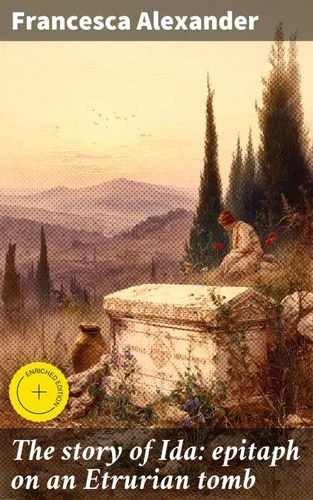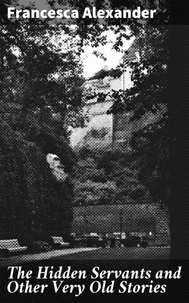The story of Ida: epitaph on an Etrurian tomb. Enriched edition. Love and Loss in Etruria: A Poetic Tale of Remembrance
Par : , ,Formats :
Disponible dans votre compte client Decitre ou Furet du Nord dès validation de votre commande. Le format ePub est :
- Compatible avec une lecture sur My Vivlio (smartphone, tablette, ordinateur)
- Compatible avec une lecture sur liseuses Vivlio
- Pour les liseuses autres que Vivlio, vous devez utiliser le logiciel Adobe Digital Edition. Non compatible avec la lecture sur les liseuses Kindle, Remarkable et Sony
 , qui est-ce ?
, qui est-ce ?Notre partenaire de plateforme de lecture numérique où vous retrouverez l'ensemble de vos ebooks gratuitement
Pour en savoir plus sur nos ebooks, consultez notre aide en ligne ici
- Nombre de pages44
- FormatePub
- ISBN406-633--952600-6
- EAN4066339526006
- Date de parution10/07/2023
- Protection num.Digital Watermarking
- Taille1 Mo
- Infos supplémentairesepub
- ÉditeurGOOD PRESS
Résumé
In "The Story of Ida: Epitaph on an Etrurian Tomb, " Francesca Alexander weaves a poignant narrative that illuminates the life and legacy of Ida, a young woman whose story is etched in Etruscan antiquity. Through lyrical prose and vivid imagery, Alexander explores themes of love, loss, and the passage of time, juxtaposing Ida's ephemeral existence with the enduring nature of her tomb. Rooted in a meticulous understanding of Etruscan culture and historical context, the text transcends mere storytelling, becoming an exploration of identity and memory against the backdrop of a civilization long gone but not forgotten.
Francesca Alexander, an eminent 19th-century writer and illustrator, drew inspiration from her profound interest in history and art, particularly the rich tapestry of ancient cultures. Her background as a talented artist, combined with her extensive travels in Italy, allowed her to immerse herself in the very landscapes and histories that inform "The Story of Ida." This personal connection to the Etruscan narrative enriches her depiction, as she strives to resurrect the past through her evocative storytelling.
Readers seeking a deep connection to history and a celebration of fleeting beauty will find "The Story of Ida" a remarkable journey that resonates across time. This book is particularly recommended for those interested in the interplay between art, literature, and archaeology, as it not only tells a compelling tale but also invites introspection on the nature of existence and remembrance. In this enriched edition, we have carefully created added value for your reading experience: - Hand-picked Memorable Quotes shine a spotlight on moments of literary brilliance. - Interactive footnotes clarify unusual references, historical allusions, and archaic phrases for an effortless, more informed read.
Francesca Alexander, an eminent 19th-century writer and illustrator, drew inspiration from her profound interest in history and art, particularly the rich tapestry of ancient cultures. Her background as a talented artist, combined with her extensive travels in Italy, allowed her to immerse herself in the very landscapes and histories that inform "The Story of Ida." This personal connection to the Etruscan narrative enriches her depiction, as she strives to resurrect the past through her evocative storytelling.
Readers seeking a deep connection to history and a celebration of fleeting beauty will find "The Story of Ida" a remarkable journey that resonates across time. This book is particularly recommended for those interested in the interplay between art, literature, and archaeology, as it not only tells a compelling tale but also invites introspection on the nature of existence and remembrance. In this enriched edition, we have carefully created added value for your reading experience: - Hand-picked Memorable Quotes shine a spotlight on moments of literary brilliance. - Interactive footnotes clarify unusual references, historical allusions, and archaic phrases for an effortless, more informed read.
In "The Story of Ida: Epitaph on an Etrurian Tomb, " Francesca Alexander weaves a poignant narrative that illuminates the life and legacy of Ida, a young woman whose story is etched in Etruscan antiquity. Through lyrical prose and vivid imagery, Alexander explores themes of love, loss, and the passage of time, juxtaposing Ida's ephemeral existence with the enduring nature of her tomb. Rooted in a meticulous understanding of Etruscan culture and historical context, the text transcends mere storytelling, becoming an exploration of identity and memory against the backdrop of a civilization long gone but not forgotten.
Francesca Alexander, an eminent 19th-century writer and illustrator, drew inspiration from her profound interest in history and art, particularly the rich tapestry of ancient cultures. Her background as a talented artist, combined with her extensive travels in Italy, allowed her to immerse herself in the very landscapes and histories that inform "The Story of Ida." This personal connection to the Etruscan narrative enriches her depiction, as she strives to resurrect the past through her evocative storytelling.
Readers seeking a deep connection to history and a celebration of fleeting beauty will find "The Story of Ida" a remarkable journey that resonates across time. This book is particularly recommended for those interested in the interplay between art, literature, and archaeology, as it not only tells a compelling tale but also invites introspection on the nature of existence and remembrance. In this enriched edition, we have carefully created added value for your reading experience: - Hand-picked Memorable Quotes shine a spotlight on moments of literary brilliance. - Interactive footnotes clarify unusual references, historical allusions, and archaic phrases for an effortless, more informed read.
Francesca Alexander, an eminent 19th-century writer and illustrator, drew inspiration from her profound interest in history and art, particularly the rich tapestry of ancient cultures. Her background as a talented artist, combined with her extensive travels in Italy, allowed her to immerse herself in the very landscapes and histories that inform "The Story of Ida." This personal connection to the Etruscan narrative enriches her depiction, as she strives to resurrect the past through her evocative storytelling.
Readers seeking a deep connection to history and a celebration of fleeting beauty will find "The Story of Ida" a remarkable journey that resonates across time. This book is particularly recommended for those interested in the interplay between art, literature, and archaeology, as it not only tells a compelling tale but also invites introspection on the nature of existence and remembrance. In this enriched edition, we have carefully created added value for your reading experience: - Hand-picked Memorable Quotes shine a spotlight on moments of literary brilliance. - Interactive footnotes clarify unusual references, historical allusions, and archaic phrases for an effortless, more informed read.




